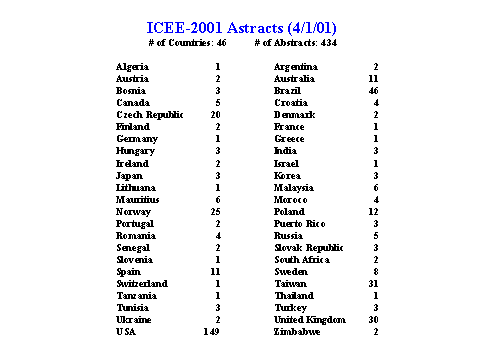
Invited Paper
International Seminar:
Engineering Education in the Global World
On Occasion of 80th Anniversary Celebration
Donetsk State University
Donetsk, Ukraine
May 31 – June 3, 2001
Win Aung, Ph.D., Dr.h.c., P.E.
National Science Foundation
Arlington, VA 22230, U.S.A.
Secretary General, iNEER/ICEE
Editor, www.ineer.org
Radim Farana, Ph.D.
VSB – Technical University of Ostrava
Ostrava, Czech Republic
Webmaster, www.ineer.org
The purpose of this paper is to describe recent activities by the International Steering Committee of the International Conference on Engineering Education (ICEE-ISC), and by the International Network for Engineering Education and Research (iNEER). Organized as an information exchange and partnership forum, ICEE emphasizes advancing teaching and learning in engineering through collaboration and networking. It is a conference series that highlights the worldwide progress and experiences in engineering education and research, especially in the context of international cooperation.
The history of the formation of ICEE-ISC and iNEER will be summarized. Examples of recent activities will be provided. Features of the iNEER website and information repository, developed, implemented and maintained through multinational institutional cooperation and support, will be explained.
It is well understood by economists that the progress of nations since the industrial revolution has been driven by continual technological innovation, obtained through the pursuit of scientific understanding and application of engineering solutions. Now, more and more people are recognizing that our future well being will depend on citizens of all nations working together, particularly in higher education in science and technology.
In the last several years, companies around the world have been expanding the global reach of their R&D efforts. Increasingly, global R&D is being viewed as providing companies with access to leading-edge scientific developments, new technologies, and fresh ideas. In 1998, Procter and Gamble’s R&D infrastructure included 22 significant laboratories in 12 countries, with 12% of the company’s researchers located outside the U.S. Companies such as P&G clearly see tremendous benefits that can accrue from increased international cooperation in science and technology. (For more details, visit http://www.ineer.org, click under ”Report/Talks” and scroll down to paper by John Pepper.)
Recent trends in international cooperation in higher education and in science and technology show that industrial nations with established funding mechanisms to support international cooperation give this activity high priority. For example, in 1995, the U.S. Government alone spent $3.3 billion on multinational and binational collaboration.
Even though the value placed on international cooperation is high and its priority is also visible at the policy level, budget constraints have caused the priority to drop significantly in actual implementation. For example, again in the U.S.A., though the above figure appears high, it represented but a small fraction of the funding for domestic programs. The same is true with other countries.
In part because of this, experts believe that the scientific and engineering communities around the world are isolated from each other, even though their domestic programs may be quite well funded. Bruce Alberts, past president of the National Academy of Sciences in the U.S., has said ”a new generation of researchers has little knowledge about the opportunities and challenges of working with scientists abroad.” He added: ”The young people have enormous potential interest in such research, but they don’t see how to do it.”
To many people, international cooperation in education, including engineering education, is a relatively new undertaking. Beyond conferences, workshops, and joint degree programs, many of the rules and practices are not yet defined.
How can researchers work together across international boundaries, sharing financial resources and intellectual capital to develop curricular materials that answer the needs for diversity, and high quality education experience for students, including cultural consciousness and global-connectedness? How can we work together to advance the use of distance learning? How can we share approaches, learning from each other to be better teachers and learners?
Issues such as these are in the minds of funding agency officials as much as in the minds of educators themselves.
These issues are ripe for the international community to address. What do we see as the answers for the short and long terms? Should we:
Propelled in part by the issues discussed above, the international community in engineering education and research has been meeting once a year since 1994 (except for 1996) under the umbrella of the International Conference on Engineering Education (ICEE), organized under the sponsorship of the ICEE International Steering Committee.
An information dissemination and exchange, networking and partnership development forum, each ICEE is hosted by locally constituted program and organizing committees, which inculcate into the conference programs the unique regional historical perspective, and cultural practices. It emphasizes international and multinational collaboration, partnerships and networking in achieving progress. The conference series highlights the worldwide progress -- especially in the context of international partnerships -- and experiences in engineering education and research and related fields. As such, ICEE provides a platform to strengthen existing partnerships, or to create mutually beneficial new collaborative efforts.
ICEE welcomes everyone to participate without regard to national origin, race, color or creed. In its usual two-part format, ICEE includes a 1-2 day workshop to discuss plans for cross-regional collaboration in addition to a traditional 2-3 day meeting for contributed papers and invited talks.
While each ICEE is identified with the host institution and city but not with the country, the venue is rotated to different regions around the world, so that the same region does not play host more than once every five years, when there is a new host able and willing to organize a conference. ICEE’s principal supporter is the International Network for Engineering Education and Research (iNEER). Other support comes from industry and academic sponsors. It is led by the ICEE International Steering Committee (ISC).
As of May 2001, the following ICEEs have been convened or are being planned. Numbers in parentheses are the estimated numbers of participants.
|
ICEE - |
1994: |
Taipei (120) |
|
1995: |
Taipei (120) |
|
|
1997: |
Chicago/Carbondale (250): http://www.siu.edu/~coalctr/icee2.htm |
|
|
1998: |
Rio de Janeiro (550): |
|
|
1999: |
Ostrava/Prague (400): |
|
|
2000: |
Taipei/Tainan (400): |
|
|
2001: |
Oslo/Bergen (450): |
|
|
2002: |
Manchester: |
|
|
2003: |
Valencia |
|
|
2004: |
Gainesville |
|
|
2005: |
Future: Krakow/Gliwice, Northern Virginia/Blacksburg, Mayaguez, Seoul... |
The ICEE-ISC decided in 2000 to establish the International Network for Engineering Education and Research (iNEER). The objective was mainly to provide continuity from one conference to the next; ensure consistency in quality of the conferences; and to provide more visibility and a focused identity. The ISC saw the need to provide a mechanism to enhance the value and concept of ICEE, by enabling and promoting further progress in education and research through international partnerships and information exchange.
iNEER is an independent, volunteer networking organization. Specifically, its goals are to: (a) co-sponsor and facilitate the organization of high quality ICEEs; (b) initiate other international forums, specialist workshops and conferences at selected sites as needed; (c) develop new mechanisms and programs that promote international cooperation; (d) develop and maintain a directory and repository of information for international cooperation in research and education; and (e) assemble and disseminate updated information on related topics.
The iNEER ”virtual” headquarters are currently located at New Jersey Institute of Technology. Southern Illinois University at Carbondale, IL, USA, and the VSB – Technical University of Ostrava in Ostrava, Czech Republic, both long-standing co-sponsors of ICEE, are continuing to provide important core support. Contributions also come from other academic, industrial and government institutions.
A web-based information system has been developed with support from the above three institutions and from industry. A mission of iNEER is the support of a continuously updated directory and repository of information on international collaboration, in which researchers and educators interested in collaborative activities may: (1) find partners for collaborative activities including short-term exchange programs and longer term joint programs; and (2) key in summaries of their education research activities for information dissemination and for establishing potential contacts for future collaboration. This is incorporated in its website. Instructions on its usage are posted.
iNEER and ICEE-ISC have continued to work closely with the ICEE program and organizing committees to engage the community at large in timely topics. For example, information about ICEE-2001 was widely published with carefully timed announcements. The community includes not only those in engineering education, but in research. In addition to engineering, the community also includes faculty, students and practicing professionals in related areas such as mathematics, physics, chemistry, computer science, computer engineering, education psychology, ethics, and materials. Community members are located in all regions around the world.
Community members’ feedback was solicited after the conclusion of ICEE-2000. Separately, community input was invited on conference program development for ICEE-2001. Based on the feedback and input, special calls for papers, education workshops and panel sessions were developed.
As of April 1, 2001, 434 abstracts from 46 countries were submitted to ICEE-2001, about 1/3 higher than at this time last year for ICEE-2000. The following chart shows the distribution of the abstracts by countries:

The number of countries -- 46 -- is higher than that for ICEE-2000 (26) and, thanks to the encouragement of Trond Clausen, ICEE-2001 General Chair, for the first time a significant number of abstracts has come from African nations.
To target emerging topics, the following specific calls for papers were issued in the fall of 2000:
The first two topics are aimed at highlighting the progress achieved in academic efforts in integrating education and research in emerging areas. The next three topics deal with topics of broad concern to the international education community. For additional information on the Bologna Declaration, please visit the iNEER website, click on ”Reports/Talks” and select the topic at the top of the page.
New participants this year will include a contingent from the Greenfield Coalition that will be involved in organizing a session on manufacturing education. Headquartered at Wayne State University in Detroit, Michigan, U.S.A., Greenfield is a consortium of engineering institutions that work closely with automotive manufacturers to provide a high quality education experience for minority high school students. It is supported by the U.S. National Science Foundation, and includes FocusHope as a partner. The latter is a unique machinist training and education institute that provides work-based manufacturing education opportunities for minority high school students.
ICEE-2001 is planning to have four multi-national education partnership workshops. Other partnership development initiatives include formal signing of new cooperative agreements by heads of academic institutions. These agreement are under development. As a result of past ICEE workshops and agreements, numerous international exchanges have started. These exchanges involve both administrators and young researchers. For example, as we write this, three administrators from the Silesian University of Technology in Gliwice, Poland are visiting their partners at the University of Florida, University of Missouri – Rolla and Southern Illinois University at Carbondale, Illinois. Also, three students from the Czech Republic are studying at the University of Missouri – Rolla, having started in January 2001. Two post-doctoral researchers will be arriving at NJIT from VSB Technical University of Ostrava later this year.
The signing ceremony for international cooperative agreements at ICEE-2001 will follow the grand signing event conducted in Taiwan at ICEE-2000. (To see photographs of the signing ceremony, visit the www.ineer.org website and click on ”New Photo Albums Added” under QUICK LINKS at the top of the main page. Then go to the ”ICEE 2000” link.) Four agreements were signed at the ICEE-2000 conference banquet in front of approximately 400 attendees, in the Hall of Golden Dragon on the top floor of the Grand Hotel in Taipei, promulgating the following new partnerships:
This iNEER website contains selected information on engineering research and education relevant to international partnerships. It provides information on ICEE, including recent and future conferences. Announcements on key events and new programs related to international cooperation are posted. Links to other relevant sites, such as ICEE-1998, 1999, 2000, 2001 are provided. Proceedings and abstracts of these conferences are archived. Timely links to available resources for collaborative efforts in engineering education and research are provided.
Anecdotal reports of significant events are posted.
The website has a directory and repository for information on international engineering education and research. To promote information exchange, reports and important correspondences related to iNEER/ICEE-ISC are archived on the website. Photographic records of typical scenes of business activities, as well as of an informal networking nature, from past ICEE and ISC meetings are presented.
The overall system includes static HTML pages and database connection based on the Active Server Pages (ASP) technology. The web master and administrator of the iNEER information system may be contacted by e-mail at: waung@ineer.org or rfarana@ineer.org
A new web counter was set up recently and shows that this website receives over 550 visits over a recent four-week period.
Figure 1 shows the current look of the iNEER main page.
Listing of members of the ICEE-ISC are shown on one page, as indicated partially in Fig. 2.
Figure 3 gives a partial view of the ”Report/Talks” page that contains a listing of special reports and presentations saved on the iNEER website.
Last but not the least, Fig. 4 shows the list of iNEER sponsors.
For those readers who have not heard about iNEER and ICEE, we hope we have succeeded in presenting a broad-brush look at what these two organizations are doing and where they are heading. We hope we have intrigued you enough that you will want to learn more about us. For those who know something about us, we hope we have provided a useful update and encouraged your continued interest and support.
We invite all of you to give us your help and be a part of the evolving international partnership movement. Please give us your comments and feedback to help us become better engaged to you and hence be more effective.
We invite you to correspond with us. The world is getting smaller and we must work together to break down the obstacles and barriers that isolate us, as mentioned in the introduction. Please share with us information about yourselves, your institutions, your colleagues and your students. Make use of the iNEER website to share information. It is free to use; please take advantage of it. We encourage you to send us the information. If it relates to international engineering education and research and has wide enough appeal, we will be happy to post it for you.
Please network with us!
We take this opportunity to express our appreciation to every member of the iNEER and ICEE community around the world who has given us their advice, physical help and other support. Please keep your e-mails coming!
A special thank to our colleagues working on the various committees to make ICEE-2001 a great success, especially Trond Clausen, Halvor Austena, Rolf Palmgren and Dan Budny.
We also wish to thank all of the sponsors listed in Fig. 4 and on the iNEER website. We gratefully acknowledge the special contributions made to iNEER by the following organizations: Microsoft Corp., Motorola Inc., Motorola Semiconductors (HK) Ltd., National Chiao Tung University, New Jersey Institute of Technology, Southern Illinois University at Carbondale, and VSB - Technical University of Ostrava.
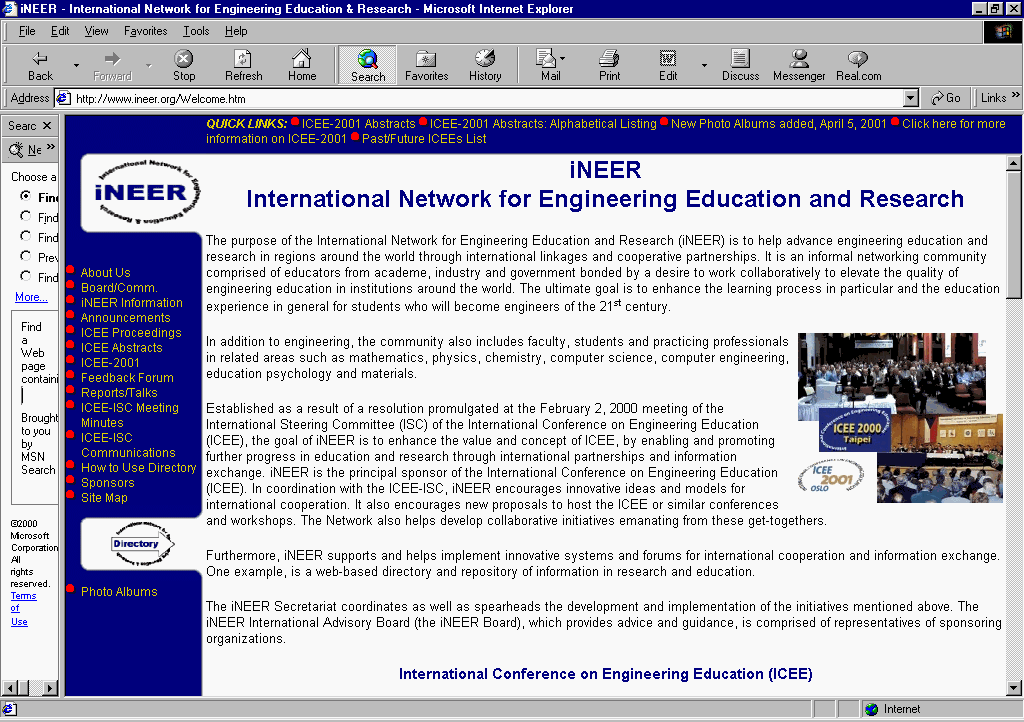
FIG. 1 The Main Page of the iNEER Website
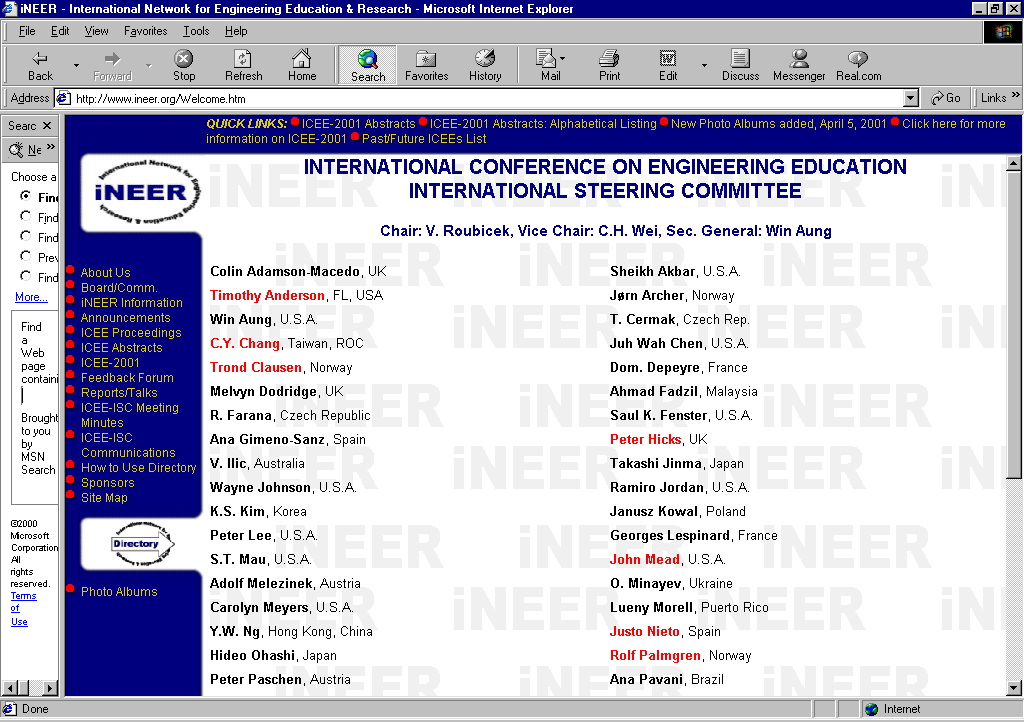
FIG. 2 Partial View of the iNEER Page Listing ICEE-ISC Members
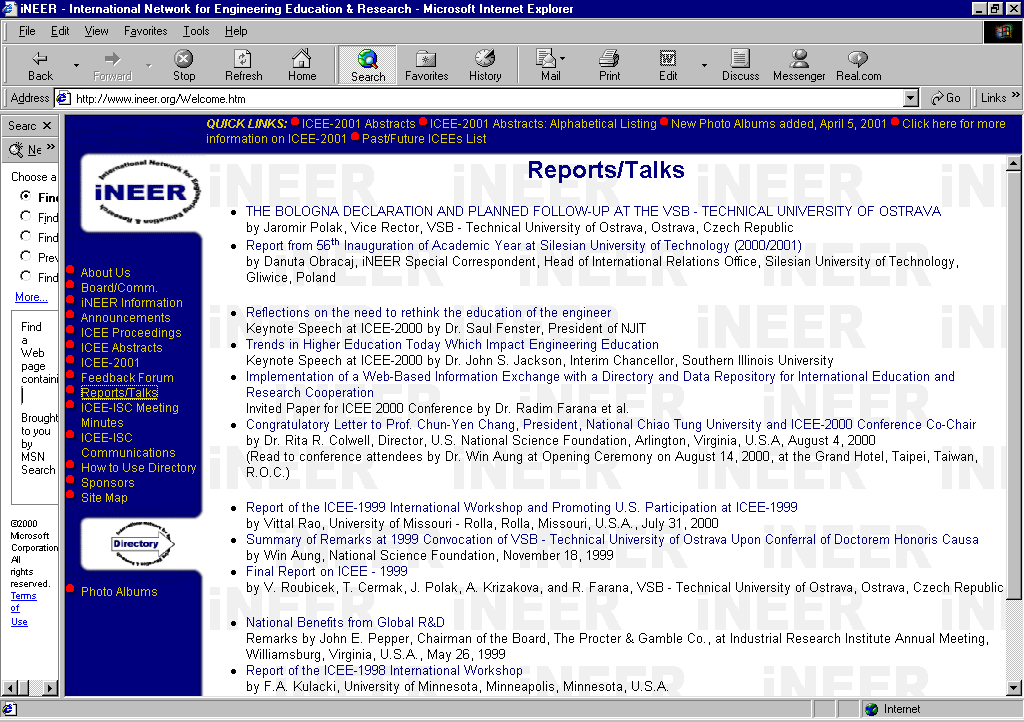
FIG. 3 Partial View of the ”Report/Talks” Page
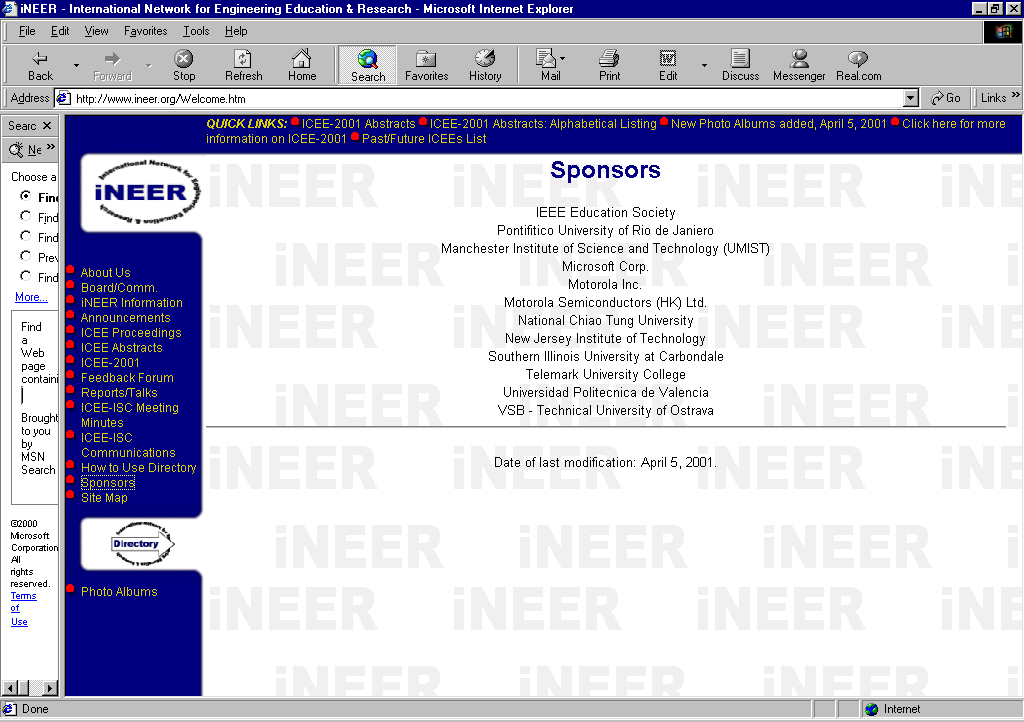
FIG. 4 Page Listing iNEER Sponsors